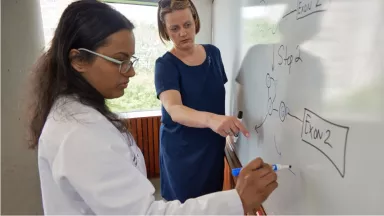Blood Cancer Institute Basic Research
Through the power of sophisticated basic research in a highly collaborative and resource-rich setting, the Blood Cancer Institute is making headway in identifying novel, targetable dependencies of blood cancer cells.
Fundamental Discoveries in the Mechanisms of Blood Cancers
Blood Cancer Institute researchers are performing high-throughput sequencing and omics assays to investigate various research areas, including:
- Molecular dependencies, including signaling, transcriptional, and epigenetic regulation, of pre-leukemic stem cells (pre-LSC) and leukemic stem cells (LSC) in normal and malignant hematopoiesis
- Maintenance of healthy and blood cancer stem cells by the bone marrow microenvironment
- Identification of novel stem cell-directed therapeutics in leukemia and other blood cancers
Example of Groundbreaking Discovery in MDS
In one example of the transformative work that’s occurring at the Blood Cancer Institute, Montefiore Einstein Comprehensive Cancer Center researchers studying signaling pathways in hematopoietic stem cells that prevent the mutated cells from developing into mature red blood cells made a singular discovery. They registered that this pathway, known as SMAD2/3, was overactive, and theorized that blocking the pathway with a drug could allow normal blood cells to develop--preventing anemia that occurs with myelodysplastic syndromes.
As a result, scientists around the world began testing potential therapies. Through clinical trials at Montefiore Einstein Comprehensive Cancer Center, they found that the erythroid maturation agent luspatercept (Rebloyzl) significantly reduced the need for blood transfusions to treat anemia in MDS patients.
In 2020—as a result of this groundbreaking work—the U.S. Food and Drug Administration approved the drug as the first new therapy for MDS in more than a decade.
Learn More About the Blood Cancer Institute
Learn more about the Blood Cancer Institute’s Translational Research and Clinical Trials as well as research published to date.







